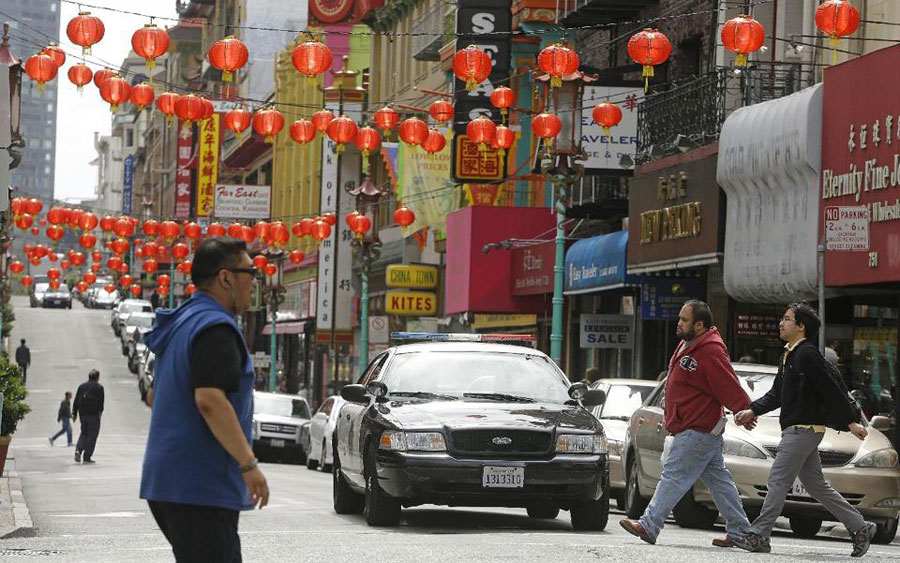FBI sting shows San Francisco Chinatown underworld
Updated: 2014-03-28 10:08
(Agencies)
The federal charges, which allege a California lawmaker accepted money and campaign donations in exchange for providing official favors and helping broker an arms deal, cast harsh light on Chinatown's tight-knit network of fraternal organizations and one of its most shadowy characters, Raymond "Shrimp Boy" Chow.
 |
|
In this image provided by Jen Siska, Raymond "Shrimp Boy" Chow, is seen posing for a portrait in San Francisco in July 2007. [Photo / Agencies] |
Investigators say Chow is the leader — the dragonhead — of one of the most powerful Asian gangs in North America. Chow's gang is said to have lured state Sen. Leland Yee into its clutches through money and campaign contributions in exchange for legislative help, as Yee sought to build his campaign coffers to run for California secretary of state.
Born in Hong Kong in 1960, Chow came to the United States at 16 and was reportedly nicknamed "Shrimp Boy" by his grandmother, in part due to his small stature.
After dropping out of high school, Chow rose within the ranks of the local Hop Sing Tong gang after he and his crew survived a 1977 shooting at a Chinatown restaurant that left five dead and about a dozen people injured.
Chow then spent a few years inside San Quentin Prison for a robbery conviction, and after his release, he started working with the Hong Kong-based Wo Hop To triad, one of numerous Chinese underground societies linked to organized crime. Chow has admitted that as a gang leader, he ran prostitution rings, smuggled drugs and extorted thousands of dollars from business owners in the 1980s.
"He was given like an unofficial position of being a leader, but to say he was sophisticated, no. He was more like a forceful brute," said Ignatius Chinn, a former California Department of Justice agent who spent years investigating Chow in the early 1990s. "If he didn't get his way, he would just beat the door down and that was how we put cases on him."
Although he ultimately was convicted of gun charges and sentenced to 25 years to life in the 1990s, Chow cut a deal to win release and returned Chinatown several years ago, pledging to stay straight. His work with at-risk youth soon won accolades from prominent politicians. But the complaint alleges that Chow used his position as the dragonhead of the Ghee Kung Tong to launder money, receive and transport stolen property and traffic in contraband cigarettes during a FBI sting.
Longtime residents and observers said the startling allegations revealed the continued presence of organized crime in the popular tourist attraction and home to one of the largest Chinese communities outside Asia.
"Chinatown is a very safe place and usually the crime you hear about there is just robberies and people being taken advantage of," said Joseph Leung, editor for the San Francisco edition of The Sing Tao Daily, the largest circulation Chinese newspaper in the U.S. "That's why this is all so shocking."
The pre-dawn FBI raid Wednesday at the Ghee Kung Tong's office, next to a massage parlor and across from a benevolent society where elderly people play Mah Jong, also brought into focus its centuries-old history. The tong was founded in the late 1880s to support immigrants from Hong Kong and elsewhere in the Pearl Delta region.
Amid morning rain showers Wednesday, federal agents and fire crews stormed the building armed with a circular saw and jaws of life to crack a safe that authorities say was at least a century old.
The organization is among dozens of active tongs, or family associations, in Chinatown, and Chow assumed control when its former president, Allen Leung, was shot to death by a masked gunman at his import-export store in 2006, said David Lee, director of the Chinese American Voters Education Committee.
"The killer was never caught and there was speculation that Shrimp Boy may have had something to do with it," said Lee, who also teaches political science at San Francisco State University. "He kind of became like a gangster celebrity. He was on parole, he had an ankle bracelet and he became a fixture at political events for a while."
